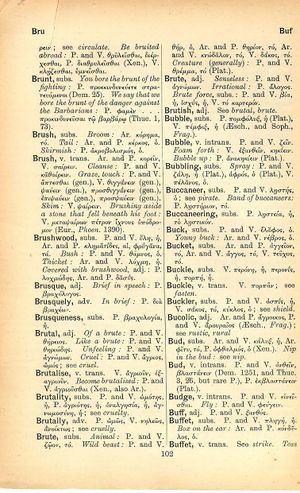brunt: Difference between revisions
From LSJ
τοῖς πράγμασιν γὰρ οὐχὶ θυμοῦσθαι χρεών· μέλει γὰρ αὐτοῖς οὐδέν· ἀλλ' οὑντυγχάνων τὰ πράγματ' ὀρθῶς ἂν τιθῇ, πράξει καλῶς → It does no good to rage at circumstance; events will take their course with no regard for us. But he who makes the best of those events he lights upon will not fare ill.
(Woodhouse 2) |
(CSV3) |
||
| Line 1: | Line 1: | ||
{{ | {{Woodhouse1 | ||
| | |Text=[[File:woodhouse_102.jpg|thumb|link={{filepath:woodhouse_102.jpg}}]]'''subs.''' | ||
<b class="b2">You bore the brunt of the fighting</b>: P. προεκινδυνεύετε στρατευόμενοι (Dem. 25). | |||
<b class="b2">We say that we bore the brunt of the danger against the Barbarians</b>: P. φαμὲν . . . προκινδυνεῦσαι τῷ βαρβάρῳ (Thuc. 1, 73). | |||
}} | }} | ||

